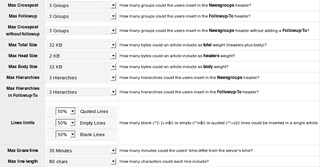
By Charly Kühnast
Network News Transfer Protocol (NNTP) has been written off many times, but Usenet will probably still be around when the last Web 2.0 forum bites the dust. This wouldn't be such a bad thing if the protocol had some kind of protection mechanisms. As things stand, people on Usenet tend to misbehave. As an admin, I once infuriated the Usenet community (abuse@kuehnast.com: Mailbox full), and then the disbelief of the offender: "Wadya mean crossposting is bad?" Postfilter adds spam and abuse protection to your server. I won't go into the installation steps here, as the homepage [1] has a fantastic guide.
Postfilter directs posts from my users through a configurable ruleset, giving me the ability to filter bad words Spamassassin-style. Matches are scored, and the server blocks the post at a certain threshold. This said, restricting crossposting is more useful in production scenarios. The max_crosspost variable in postfilter.conf defines the number of newsgroups an article can be posted in - assuming the user sets follow-ups. The default of 10 is far too high in my opinion. Without follow-up, the value in max_fup_no_crsspt applies. The default of 3 here is better, but I have set this to 1 just to be on the safe side.
You can restrict the size of a post; max_total_size is set to 32 kbytes by default - this is generous, unless one of your users is a best-selling author. For more granular control, you can set the header and body sizes separately.
Long quotes, posts that mainly comprise the effusions of previous contributors, are a constant irritation in newsgroups. Postfilters response to this lazy behavior is max_quoted_ratio. The variable accepts values between 0.0 and 1.0. Setting a value of 0.7 means a maximum of 70 percent of the post can be quotes.
While these restrictions are mainly designed to prevent my users from making fools of themselves, there are other parameters that give you protection against spammers, and rogue or just badly configured clients. First, look at the time and date: spammers tend to use a future date in the header to get to the top of the unread message list. Postfilter has a max_grace_time variable that denies posts with times that disagree with the server time. The default is 1800 seconds, that is, half an hour.
Of course, you can exercise more granular control over posting frequencies. In fact, you can specify how many messages, and the size in bytes, candidates allowed to post over a specific period of time sorted by user, domain, or IP address, and how many errors they are allowed to produce in the process before Postfilter shuts them down. allow_control_cancel isn't bad either; it allows or denies cancel messages.
Provided you don't overdo the limits, admins can avoid trouble and keep the exothermic Usenet mob at bay. After all, believing in people doesn't have to be a bad thing.
| INFO |
|
[1] Postfilter: http://news.aioe.org/spip.php?rubrique24
|
| THE AUTHOR |
|
Charly Kühnast is a Unix System Manager at the data center in Moers, near Germany's famous River Rhine. His tasks include ensuring firewall security and availability and taking care of the DMZ (demilitarized zone). |